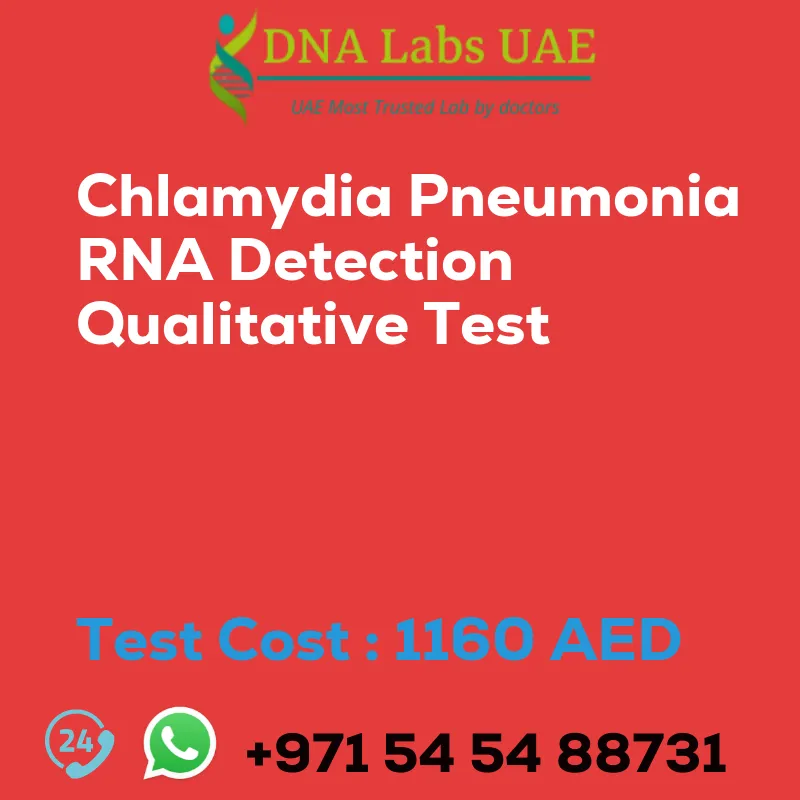Chlamydia Pneumonia RNA Detection Qualitative Test
Cost: AED 1160.0
Test Details
The Chlamydia pneumoniae RNA detection qualitative test is a laboratory test used to detect the presence of Chlamydia pneumoniae RNA in a patient’s sample. Chlamydia pneumoniae is a type of bacteria that can cause respiratory infections, including pneumonia.
The test is typically performed on respiratory samples, such as sputum or throat swabs, collected from the patient. It uses a technique called nucleic acid amplification, which amplifies and detects the specific RNA sequences of Chlamydia pneumoniae.
The test can help diagnose Chlamydia pneumoniae infection and distinguish it from other respiratory infections with similar symptoms. It is especially useful in cases where traditional culture methods may not be sensitive enough to detect the bacteria.
The qualitative test provides a yes or no answer regarding the presence of Chlamydia pneumoniae RNA in the sample. A positive result indicates an active infection, while a negative result suggests the absence of the bacteria or the presence of a very low level that may not be clinically significant.
It is important to note that this test specifically detects Chlamydia pneumoniae and not other types of Chlamydia, such as Chlamydia trachomatis (which causes sexually transmitted infections) or Chlamydia psittaci (which causes psittacosis).
Components and Price
Test Name: Chlamydia Pneumonia RNA Detection Qualitative Test
Components: C.S.F, Bronchial Swabs, Bronchial lavage, etc.
Price: AED 1160.0
Sample Condition
C.S.F, Bronchial Swabs, Bronchial lavage, etc.
Report Delivery
3rd Working Day Email: 36 hours
On phone: 24 hours
Method
Real Time PCR
Test Type
Viral
Doctor
Physician
Test Department
Genetics
Pre Test Information
Need to sign Consent document and bring any clinical history of patient for Chlamydia Pneumonia (RNA Detection) Qualitative Test
Test Results
The test is typically performed in a laboratory setting and requires specialized equipment and trained personnel. It may take a few days to receive the test results. Treatment decisions should be made in consultation with a healthcare provider based on the test results and the patient’s clinical presentation.
| Test Name | Chlamydia Pneumonia RNA Detection Qualitative Test |
|---|---|
| Components | |
| Price | 1160.0 AED |
| Sample Condition | C.S.F, Bronchial Swabs, Bronchial lavage etc. |
| Report Delivery | 3rd Working Day Email:-36 hours.On phone: 24 hours |
| Method | Real Time PCR |
| Test type | Viral |
| Doctor | Physician |
| Test Department: | Genetics |
| Pre Test Information | Need to sign Consent document and bring any clinical history of patient forChlamydia Pneumonia (RNA Detection) QualitativeTest |
| Test Details |
The Chlamydia pneumoniae RNA detection qualitative test is a laboratory test used to detect the presence of Chlamydia pneumoniae RNA in a patient’s sample. Chlamydia pneumoniae is a type of bacteria that can cause respiratory infections, including pneumonia. The test is typically performed on respiratory samples, such as sputum or throat swabs, collected from the patient. It uses a technique called nucleic acid amplification, which amplifies and detects the specific RNA sequences of Chlamydia pneumoniae. The test can help diagnose Chlamydia pneumoniae infection and distinguish it from other respiratory infections with similar symptoms. It is especially useful in cases where traditional culture methods may not be sensitive enough to detect the bacteria. The qualitative test provides a yes or no answer regarding the presence of Chlamydia pneumoniae RNA in the sample. A positive result indicates an active infection, while a negative result suggests the absence of the bacteria or the presence of a very low level that may not be clinically significant. It is important to note that this test specifically detects Chlamydia pneumoniae and not other types of Chlamydia, such as Chlamydia trachomatis (which causes sexually transmitted infections) or Chlamydia psittaci (which causes psittacosis). The test is typically performed in a laboratory setting and requires specialized equipment and trained personnel. It may take a few days to receive the test results. Treatment decisions should be made in consultation with a healthcare provider based on the test results and the patient’s clinical presentation. |








